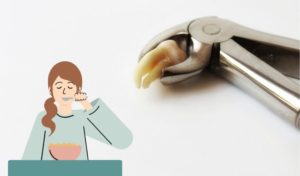What to Eat and What to Avoid After a Tooth Extraction?
 What you eat after getting a tooth extraction can affect how you feel as you recover from the procedure. While it is common to experience soreness and swelling following an oral medical procedure, many patients do not suffer so much after an extraction. All these can make chewing and eating a bit of a challenge. Certain foods can help you through the recovery phase, while some can agitate your condition. Here are some foods you can eat and should not eat after your teeth extraction.
What you eat after getting a tooth extraction can affect how you feel as you recover from the procedure. While it is common to experience soreness and swelling following an oral medical procedure, many patients do not suffer so much after an extraction. All these can make chewing and eating a bit of a challenge. Certain foods can help you through the recovery phase, while some can agitate your condition. Here are some foods you can eat and should not eat after your teeth extraction.
Foods You Can Eat After Tooth Extraction
- Fresh smoothies. Soothe your aching gums while stabilizing your gut health by making smoothies with probiotic-rich yogurt. Add Greek yogurt to your smoothies and mix in naturally sweet additives like frozen fruit or cocoa powder.
- Soups and canned broths. Soups and good, but not all of them are great after oral surgery. Chicken noodle soup, for example, can have chunky add-ins that require you to chew. It helps to separate the vegetables and meat and chop them up so you can swallow them without any trouble.
- Eggs. Soft-scrambled eggs are the easiest and most delicious meal you can enjoy after tooth extraction. Stir them in a pan with your favorite cheese and eat them with an avocado for a hearty meal.
- Cheese. Cheese is a great source of antibiotics. You can swallow them in small pieces. You can also shred them to add to any meal you consume as you recover. Cottage cheese particularly makes for a great snack.
- Oatmeal. Instant oatmeal is a good option for breakfast. You should stay away from steel-cut oats because they can be hard to swallow whole. Eat a basic oatmeal and add in some soft fruit like mashed blueberries or bananas.
- Mashed potatoes. You can use boxed instant mashed potatoes or make a soft, creamy, and delicious one from scratch. Mix in small additions to your recipe like finely diced herbs or bacon.
- Frosting, pudding, and sheet cakes. You can eat select desserts while you are recovering, like pudding or gelatin. A cupcake or frosted cake can also be managed with a spoon. Finish it off with a glass of cold milk to wash everything down.
Foods You Should Not Eat After Tooth Extraction
- Roasted vegetables. Whether you slice or dice them, roasted vegetables are not easy to chew and swallow following tooth extraction. The best way to enjoy your vegetables is to puree them into a warm soup.
- Meats. You can forget about having beef, pork, poultry, or fish during mealtimes. If you want to eat meat, cut them into tiny pieces and eat them slowly. Just be extra cautious as they can turn into a choking hazard.
- Bread. While you are recovering, stay away from muffins, bagels, toast, and crusty bread for a while because they can damage your gums. After a few days, once your gums and jaw are feeling a little stronger, start with sweet rolls since they are soft.
- Spicy foods. Salt and pepper are essential for every home cook. However, it is wise to avoid them in excess if you do not like the lingering burning and stinging in the mouth after eating. The same goes for spices like chili powder and cayenne pepper.
- Pretzels, crackers, seeds, chips, and nuts. Stay away from these snack items for a few days after tooth extraction. Its high sodium content can irritate your currently sensitive tooth and gums. Plus, these small crunchy snacks can get stuck in your healing holes.
It is important to take special care of your tender gums and mouth following a tooth extraction. Reduce the discomfort by consuming soft foods and liquids as you heal. The good news is that there are still lots of delicious foods that you can eat as you recover. Get creative and add a special touch to these soft food suggestions.
You may also read: Is It Painful to Remove Wisdom Teeth?





 |
|